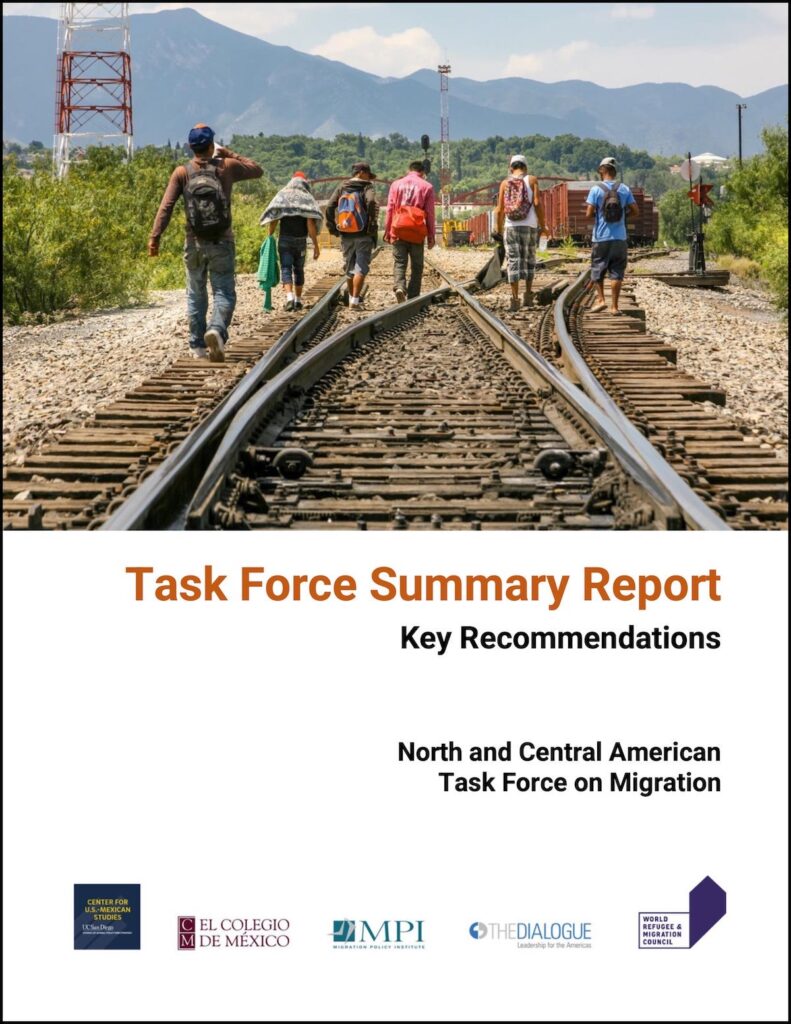North and Central American Task Force on Migration
May 2022

The North and Central American Task Force on Migration is a non-governmental forum of academics, civil society and business leaders, and former policymakers established to facilitate a broadly driven dialogue among the countries involved in the crisis of migration and forced displacement in the region, with a particular focus on the three countries of Northern Central America: El Salvador, Guatemala and Honduras. Initiated by the World Refugee & Migration Council with the Center for U.S.-Mexican Studies, El Colegio de México, the Migration Policy Institute and the Inter-American Dialogue, and supported by the Government of Canada, the Task Force has met monthly since May 2021 to develop concrete recommendations for collective, regional action to address both the immediate needs of migrants and to respond to the longer term economic security and governance issues that impel migrants and asylum-seekers to embark on often treacherous journeys towards North America.
This has been an intensive, consultative process. The Task Force has consulted with academic experts, civil society and private sector representatives, government officials, and UN representatives in developing its recommendations. Smaller working groups grappled with specific issues — from humanitarian protection in the region to the development of alternative migration pathways. Five interim reports have been issued which provide both analysis and suggested actions. Research has been commissioned and 12 research papers have been published.
The high-level recommendations of the Task Force are:
- A comprehensive, strategic, regional approach is needed to address migration from Northern Central America. No one country can deal with the complexities of this migration on its own. Central American governments, together with civil society and the private sector must intensify efforts to address the systemic political and economic factors that have led millions of Central Americans to leave their countries.
- Governments in Northern Central America must address the political, economic and institutional drivers of migration. There are no quick fixes to address the drivers of migration; fundamental political, institutional and economic change is necessary. While foreign investment in Central American economies is needed, systemic issues of political will and corruption must be tackled to reduce political risk. Respect for human rights and rule of law are needed to provide human security and education, and health care and social infrastructure must be strengthened. This will take time and political courage. While governments of the migrants’ countries of origin must demonstrate a commitment to change, other governments in the region must step up to support these efforts.
- The United States, Canada and Mexico must increase legal channels for Central Americans to migrate – through both labor migration and protection pathways. Central Americans are migrating through irregular means because there simply are not enough legal pathways to migrate.
- All regional actors — from Central American governments to donors, international NGOs and financial institutions — must find ways to support the active engagement of civil society in addressing the drivers of migration, supporting migrants and returnees, and in advocating for needed policy changes. Civil society actors are playing a valiant, humanitarian role in the region but are under threat and under-resourced.
The Task Force has developed 70 recommendations with over 80 pages of background information in interim reports on specific aspects of Central American migration. In this summary report, we highlight a few recommendations in each of the six areas of focus, including recommendations which can be implemented in the next few months as well as those which will show results in the longer term, but which should be started now. We understand that political leaders need to be seen to be taking immediate action. While it may be politically expedient to postpone those actions whose effects are likely to be seen years from now, if measures aren’t taken to address the long-term drivers of migration, the pressures will continue to grow. We believe that all governments in the region have a responsibility to take actions which will reduce the pressures on Central Americans to leave their countries and to support those who migrate. More importantly, we believe that those actions should be taken in concert and by the countries of the region working together.
The following sections outline key recommendations under each of the Task Force’s six areas of focus:
- Developing a comprehensive, strategic regional approach to Central American migration
- Protecting women, children, indigenous populations and the internally displaced in Northern Central America
- Developing alternative migration pathways
- Tackling political-institutional drivers of migration
- Addressing economic and environmental drivers of Migration in Northern Central America
- Changing the narrative and supporting integration
The key recommendations in each of these sections were developed based on a series of corresponding research papers commissioned by the Task Force as well as detailed interim reports with additional recommendations, all of which are available on the North and Central American Task Force on Migration website at wrmcouncil.org/TaskForce.
Addressing the drivers of migration, protecting people in the region and upholding the rights of migrants at all stages of their journeys are not tasks for the faint-hearted! Political will, economic resources and creative thinking are needed. But the Task Force is convinced that the human, political and financial capital exists in the region to tackle these challenges. The time to begin is now.
